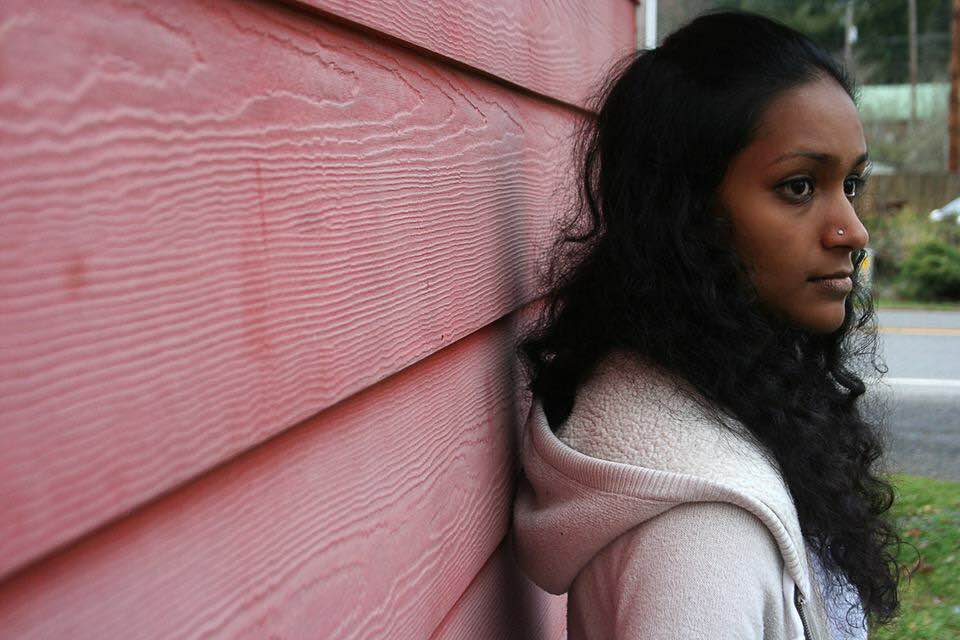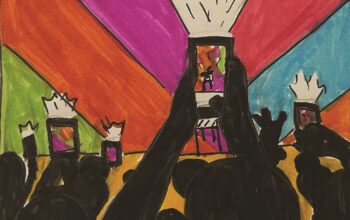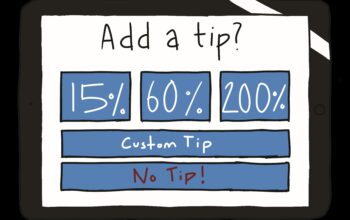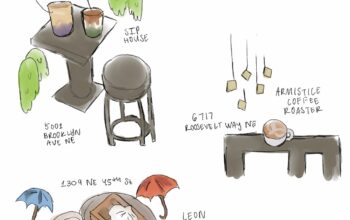Madhavi Narayanan, Roosevelt’s 2012-13 Valedictorian and ASR president, is currently a sophomore at Harvard University. Her piece, “A College Story”, talks about her transition into college from Roosevelt and the abrupt shifts that came with it. The featured photo is complements of Narayanan.
I was never excited about the idea of college. I had everything I wanted in high school – a family who loved me, teachers who supported me, friends who would be there whenever I asked. I didn’t like the idea of being all on my own, dropped in the middle of what I imagined to be a never-ending party that I had no interest in.
Roosevelt High School was the best home I could have ever asked for. I ran from class to class, meeting to meeting, walked around after school taking tape off of posters to keep the custodians happy. I was so incredibly proud and happy to serve this home away from home in some small way. Roosevelt was a community for me that was supportive and encouraging, and leaving it excited me in no way.
When I was offered late admission to Harvard (I was informed of my acceptance a month before I was expected to move in), everything seemed to be coming at me at once. Leaving my family, my school, my friends – everyone else seemed excited. Why wasn’t I? I mean, this is HARVARD we’re talking about. Showing any reluctance to going there was seen as downright douchey.
I arrived at Harvard ready to make full use of its academic resources. Because of my delayed admission, I missed the housing assignment process, so I lived alone in the dorm furthest from campus. But I refused to allow myself to get lonely – I picked classes that I knew were challenging, but interesting, and I devoted all my energies to them. I was on a mission to prove that I, Miss Late-Admission from a public school on the other side of the country, could make it at Harvard.
And I did. I took upper level courses, but focused all my time on my academics, and received all A’s my first semester. I was proud of myself, but something was wrong. I didn’t want to go back. At the end of January, I couldn’t put it off any longer and returned to campus to begin my second semester. This time I was taking an extra class, all bland requirement classes that I wanted to be done with so that I could get into upper level courses during my sophomore year.
I misunderstood the power of loneliness my freshman year. Less than a month into my second semester, I cracked. I passed out after donating blood and was sent to a hospital, where I spent a week having panic attacks. I had developed serious depression and severe anxiety.
I didn’t even know what those words meant, and I hated the sound of them. Hoping to replicate my first semester, I took the doctor’s words as a challenge. I made myself calm down and stop feeling so sorry for myself. There was nothing wrong with me, I told myself. I just had to be strong, be an adult. I refused the anti-depressants offered to me and returned to my classes.
But the loneliness grew and this time it came with more panic attacks, nights of no sleep, and constant sobbing in my room. What hurt me the most was that nobody cared. My dorm walls were thin, but none of the people who lived around me cared to approach me during the nights I was yelling and sobbing. People walked straight past me in the dining hall, where I sat every breakfast, lunch, and dinner, alone, sometimes with tears streaming down my face.
I felt so weak but didn’t know how to pull it together. The depression nagged me from inside and I didn’t know that I couldn’t just push through it. I couldn’t study because I was constantly crying and unable to sleep, I walked from class to class like a zombie, emerging with an empty notepad. I brushed my parents to the side, making up excuses not to talk to them. They had enough on their plates and I had to show that I was strong enough to be on my own.
And then it happened. In early March I woke up at 8am realizing that I had only slept two hours and had not even begun studying for my economics midterm that was scheduled to be that evening. Everything I tried to push away came flooding at me: nobody wanted me there, I was a failure, destined to be a weak person dependent on my family. My depression enclosed me and I opened the fourth floor window of my dorm, and pushed myself onto the ledge, ready to jump. I sat there for 35 minutes. Those were the longest 35 minutes of my life.
The most I had thought about suicide before that semester was in 9th grade health class when we had to write a report about it, and we learned about depression, anxiety, bipolar, and a load of other mental health diseases. Back then they were so distant, not truly real in the world we lived in.
I made the right choice that day and stepped away from the window and had two people I trusted come and physically restrain me from doing it again. I ended up spending a week at the psychiatric ward, wondering what had happened and looking at a long journey towards getting better.
Just one year before I was roaming through the halls of RHS, exchanging smiles and running ASR activities, happy as can be. I thought I was ready for college – I was ready to study, knew how to cook and clean for myself. But what nobody told me was that college was HARD. Not because of the academics, but because for the first time you are completely alone. People walk around with their heads stuck so much in their own business that you may slip completely out of their notice.
National Alliance for Mental Health reports that one in four young adults between the ages of 18 and 24 have a diagnosable mental illness and that more than 25 percent of college students have been diagnosed or treated by a professional for a mental health condition within the past year. That’s 6 people in each Roosevelt classroom.
So next time you walk down a hallway or move into your college dorm, open your eyes. Exchange more than a “How are you?…Good.” We talk about support, friendship, being there for someone to lean on. But what does that mean? Everyone has their own story, their own problems. A simple smile or greeting could make or break someone’s day. Look up from your own life and one day, you could be the reason someone makes the right choice if they ever end up sitting on that fourth floor window.




Madhavi, we attended K-12 together, and this story made me cry. I appreciate you sharing it.
Very powerful. Thank you for sharing and I do believe your story will save a life. ACE (Ask, Care, Escort) is a proven method to saving lives.
You & your sisters were students with my son in elementary school. I’m so glad you made the right choice that awful, powerful day. Keep choosing life. You are in my prayers.
Madhavi, thank you so much for being brave and so thoughtful in sharing your story for others to hear and benefit from. Grateful, and wishing you the very best,
Libby Nelson
Madhavi,
It does get better & there is always someone to talk to…..at the crisis clinic line 1-866-427-4747, and they will talk anytime about anything. Also you can phone your GIRL SCOUT friends from AS #1! Many of them are having the SAME trouble that you are. Technology has brought us so much closer but has made us so much farther apart….for example: there is no reason to TALK on the bus ride to school or work because we are SO BUSY on our phones! How many friends could I have made if I wasn’t planning or playing something!?!
Reach out someone else needs YOU too I bet that in the next building there is another student who is eating alone go find them!
Madhavi, you are my hero! Thank you for teaching me a lesson today.
Thank you, Madhavi, for sharing your story so that others can learn from your experience. I’m so glad you found the support you needed to get healthy. And so very grateful that you are here today and will be here tomorrow.
–Liz Diether-Martin, former RHS and HFB mom.
Madhavi am so glad you didn’t jump and found help and additionally shared this story. Hope you are feeling better now.
Madavi (a mom of a child going to college this fall)
As tough as this story goes, and as intelligent as she is, Madhavi appears to have made some really poor choices – except eventually choosing life over death at the most critical moment. For clearly 6 months after joining Harvard, what happened to “a family who loved me, teachers who supported me, friends who would be there whenever I asked”? Why didn’t she reach out to them for support? While at the dorm, instead of blaming the people who just walked by and didn’t “care” for her as she perceived it, why didn’t she smile at someone or work at creating new friendships? It takes two hands to clap, so where was her effort in all this? Madhavi- Take responsibility for your actions and work at correcting what you missed to do! The whole world around you is not to blame for your own poor choices. Appreciate your eventually choosing life over suicide. But you need to develop a lot more emotional maturity – EQ more than IQ at this stage of your life.
The message of her piece is that she made the mistake of not reaching out to others and trying to be entirely self-sufficient, not that the world was somehow against her. Even though in her piece she says she felt alienated then, she later realized that everyone else is probably feeling just as isolated and self-involved. So now that she has gone through and learned this, she implores other to also try to start interacting with their peers more and not just get caught up in themselves. Like you said, “it takes two hands to clap”. She’s been very brave and shown us how she had to learn to put her hand forth so to speak and is imploring others to do the same.
Ram,
Not quite knowing your background, I am going to assume that you either don’t have kids yet or have Not experienced college life in America.
I came to the Maritimes as a graduate student in the late eighties and have to admit that loneliness is a trend that is growing exponentially. Technology has replaced physical social connections. Information overload is also a culprit. All that said, we are extremely proud of Madhavi, a very accomplished child hailing from an accomplished loving family, that she chose to serve as a beacon of hope to all the other children going to such a ‘pressure cooker’ environment and their parents. While I don’t quite care for the approach of your post, the only ‘ flaw’ I see with Madhavi is the fact that she ‘forgot’ the numerous strengths and talents she possesses and the numerous kids that look up to her. Unfortunately this behavior of humans and their self absorption does not stop in college. . It continues in some work places and our Indian social circles too. I sincerely hope that the college professors are made to watch out for such telltale signs.
Jaishree
Thank you for that response.
@RL, Under depression, often you are blind to the options that you have. Those who think about ending it all are making the only choice that they see. It is fortunate both for her, and for all of us who are able to read this beautifully authentic piece, that she didn’t act on a permanent solution (suicide) to a temporary problem. And, I think she has been incredibly responsible for someone so young — she has come out of this valley of despair and has bravely written about it. I view this as incredibly responsible and empathic. And as i read the article, I don’t comprehend her blaming the world — on the contrary, she is sharing a very personal part of her life for the benefit of the world. I don’t know about EQ and IQ — but maybe the most important attribute/quality that everyone needs to have is empathy.
Mr. Lakshmanan — you are entitled to your opinion, but I am wondering what your purpose is in writing your comment? Are you writing in order to support her and provide constructive advice? Or are you just criticizing a former student who decided to share an experience with other students who are about to make a similar transition and may face some of the same problems? What service do you expect to provide by telling a college student who is sharing her struggle with mental health that she has “made some really poor choices,” needs to “take responsibility for [her] actions” and that “the whole world around [her] is not to blame for [her] poor choices.” Who are you to evaluate her emotional maturity?
I’d advise you to read her essay again. At no point is she asking for pity or not accepting responsibility for her struggles. She is sharing her personal experience so that if other students struggle they will reach out and not try to struggle alone like she did during her low period. If you paid attention to the statistics she shared from the National Alliance for Mental Health, you’d realize this is a serious problem if 1 in 4 college students are struggling with mental health. I too believe in personal responsibility — like Satre stated, “we are condemned to be free.” Yet it is a lot easier to tell someone to “get over it” and “grow up” when you yourself are not battling depression, anxiety, or panic attacks.
So, I’m guessing you replied because you felt the need tell it to Madhavi straight. However, I’d encourage you to actually ponder the questions– What benefit will my comment have? Will it actually help them and serve to better their existence or does it serve my own self interest?– before posting, especially on a student newspaper blog.
You must be a very lucky person, someone who has clearly never experienced any of these feelings. I hope you remain untouched.
Mahdavi, such an inspirational story. Thank you for your honesty and humility.
Ram,
Madhavi clearly confesses to have made those “really poor choices” when she was depressed. You must be really fortunate to have never experienced depression yourself, and unable to put yourself in the position of those who are under its influence. Keeping in mind that empathy is an important element of emotional maturity, when you point a finger at her for low EQ, watch out, three of your other fingers are pointing right back at you.
“Take responsibility for your actions and work at correcting what you missed to do!” What part of Madhavi’s story does not scream out that she isn’t doing that now? Tempted to point a finger at you for low IQ thanks to pathetic scores in the reading comprehension section.
Siva
we are all such a blend of unique personalities.I perceive Mahdavi as a reserved.introvert who finds it hard to “make the first move” toward another person, while there is that other person feeling the same, and waiting.
I try to be the extrovert and reach out when I am “new.” It really works and it is amazing how many “friends” I acquire in a new place.
These friends do not start calling me or inviting me out.The succeeding encounters are casual and friendly.It takes time to develop real bosom friend out of the mix,but it just evolves, as we gradually relate to each other and our own kindred friend will fill the empty hole in life. We are created to share our lives with others. Good Luck Mahdavi, I am about 80 and I wish I could just reach out and give you a big hug.
My suggestion,. is for you to try to let go of the reserve that is holding you back, and keeps you waiting for some one to speak to you or smile . you become the one that speaks and smiles. Keep a journal of the reaction .I get lots of causual friends and a few bosom friends for life.. Harvard!!! Wow, how exciting.I am soooo happy that you did not jump.
suicide is a permanent solution to a temporary problem .You have a great future ahead.of you.
Last 2 sentences are very powerful!!
Putting your story out there is brave. Through college, grad school, investment banking, advertising agencies, and any competitive environment with driven people, this experience is very common. If it doesn’t happen in college, it certainly could happen later to you or someone close to you. It’s important for people to recognize it is normal.
Even Arjuna, the greatest warrior, was wary at Kurukshetra. We have to strive to find the strength within us.
Happy to see that you are doing well. You are smart, brave and adventures!! There is a meaning for our presence in this world. Fulfill this quest!!
@Ram, you are completely missing the point of this article and are actually someone who needs to work on their own EQ and own levels of empathy and understanding. She is not asking for sympathy or trying to get pity from others – but is trying to help out other college students realize that it is quite important to reach out to others and that friends will be there, even when it seems like you are close to the end. There are other elements that you are overlooking, such as the very common “how are you doing?” With the answer of “good”, and moving on. This is common in many institutions around the country, and it’s been so ingrained in our society, that people do it without thinking for a second longer.
Tell me something, as a banker and manager who claims to have managed teams of “200+”, do you know how your employees are doing? Do you ever stop to reach out to them and see if the hours are taking a toll on them, or if something is affecting them? If a person in your organization were to feel depressed, would you say that they need to improve their EQ? Would I be expected to reach out to you every day so that I can “take responsibility” and lead the action? Many students live out of their own calendars, and don’t take the time to stop for a second and see how they are doing.
You further say “take responsibility” for your actions. What would that entail in your eyes? If employees were to approach you with a problem like this, would your answer of “taking responsibility” be to just fire them? And what would you do if this were your daughter? Would you even stop to think about what circumstances caused such a drastic shift in her life? How self worth is connected to depression, being an introvert, or reaching out to others?
PKA
This is beautifully written and such a powerf message. I truly appreciate you having the courage to share your story! I have battled depression and anxiety in the past and am beginning college next year. Thank you so much for spreading awareness about how awful it can be to feel alone and how easy it is to help out someone having a bad day.
As someone who is starting her PhD your piece is a great source of support and guide. God bless you with abundance of strength – for yourself and to help others. Bless you . Thank you
Madhavi- Thank you so much for sharing your story. You are a person of strength, but sometimes depression and anxiety are more difficult for persons to know how to handle because you don’t necessarily deal with them in the same way as you would any other “task”. Hard work and toughing it out won’t fix this problem. I am so very happy to hear that you got help and I wish you joy as you move forward.
Madhavi, I am very proud of you for sharing this story with us. I can only imagine that it wasn’t easy to write, as it is a difficult for many of us to digest. It made me cry. You are such an amazing, talented, and caring woman. From the time I have known you, I know you make a difference in every person’s life that you touch, and know you will continue to do so. You can always count on me. Thanks for sharing.
You are a brave woman. Those of us afflicted with these issues must speak out, as you have done. You are saving lives. Your courage is an inspiration.